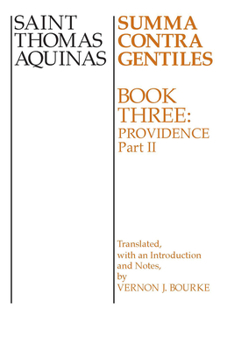Summa Contra Gentiles: Book 3: Providence, Part II
(Book #3.2 in the Summa Contra Gentiles Series)
Book Three, Part 2 of the Summa Contra Gentiles series is the second part of a treatise on the hierarchy of creation, the divine providence over all things, and man's relation to God. The Summa Contra Gentiles is not merely the only complete summary of Christian doctrine that St. Thomas has written, but also a creative and even revolutionary work of Christian apologetics composed at the precise moment when Christian thought needed to be intellectually...
Format:Paperback
Language:English
ISBN:0268016887
ISBN13:9780268016883
Release Date:January 1975
Publisher:University of Notre Dame Press
Length:282 Pages
Weight:0.85 lbs.
Dimensions:0.7" x 5.4" x 7.9"
Customer Reviews
4 ratings
Seller forgot to ship item for nearly 3 weeks, but item as described
Published by Thriftbooks.com User , 15 years ago
Item arrived as described, however seller forgot to ship the item. I e-mailed the seller to inquire about the book when it was expected to arrive and had not (approx 3 weeks later) and was informed that they forgot to ship it. This almost put me in a bind as I was needing the book by a particular date for a gift. The seller did rectify the issue, however, by mailing the item via Priority mail the next day.
How a man should live his life
Published by Thriftbooks.com User , 21 years ago
First things first. "Summa Contra Gentiles: Providence" has been published in two volumes: "Summa Contra Gentiles: Providence, Part 1", and "Summa Contra Gentiles: Providence, Part II", which must be purchased separately. The two volumes absolutely go together - the first volume has the introduction for both volumes, and the second volume has the index for both volumes.With questions of how to get it out of the way, it remains to be said what "Providence" is about and why it is worth reading.If you are familiar with Aristotle, the easiest way to describe "Providence" is that it covered much the same ground as Aristotle's "Nicomachean Ethics". This is true in the same sense that the first book of "Summa Contra Gentiles", "God" covered the same ground as Aristotle's "Physics" and that the second book, "Creation", covered the same ground as Aristotle's "De Anima". That is, it dealt with the same topics, but from a thoroughly Christian perspective.Of course, if you are not familiar with Aristotle, the above description of "Providence" is not going to be that helpful. In fact, reading that it is about "ethics" can even be misleading. In ordinary modern usage, "ethics" is taken as some set of rules regarding how to treat other people, implicitly dealing with balancing your interests against the interests of others. In traditional philosophy, however, "ethics" is much broader in scope - it covers the entire subject of how a man should live his life. "Providence" concerned ethics in this much broader, traditional sense.Within the overall framework of "Summa Contra Gentiles", "Providence" was the bridge between the first two volumes ("God" and "Creation"), which were almost entirely philosophical in character, and the last volume ("Salvation"), which was almost entirely theological.Thomas began "Providence" with a general discussion of the nature of "end", "good", and "evil". His immediate problem was to explain how evil could exist within God's creation, but in spite of the book's title, "Providence" deals with this problem in only general philosophical terms - there is nothing resembling, for example, Augustine's long exposition in his "City of God Against the Pagans" of God's plan as enacted through specific historical events. Thomas's real purpose was not to attempt to explain or justify God's plan in His creation, but to frame the central topic of the book - the problem of the achievement of human happiness.To this end, Thomas began by considering the things in which people often attempt to find happiness in this life (fame, power, wealth, the pleasures of the body, virtue), and analyzed the inadequacy of those ends, even to the extent that they could be achieved. In contrast, Thomas held up the contemplation of God as an end worthy of human striving, but also held that - through man's own power at least - that it could not be adequately attained. From this, Thomas concluded that it is only through God's grace - that is, as a gift of God - that it co
Excellent translation
Published by Thriftbooks.com User , 23 years ago
Bourke has provided a helpful and elucidating translation of this all-important text of Aquinas. A must for those interested in the thought of this great philosopher.
Excellent translation
Published by Thriftbooks.com User , 23 years ago
Bourke's translation of this important work in medieval philosophy is highly accurate and readable. A key resource for those interested in the thought of Aquinas.




